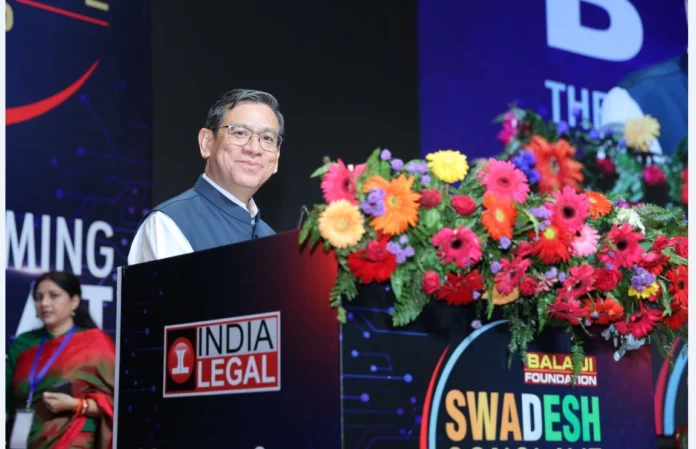By Sanjay Raman Sinha
The sixth edition of the Swadesh Conclave 2025 deliberated on the impact of technological innovation and its impact on the judicial system. The theme: “Transforming Bharat: Role of AI in Digital Age, Challenges and Legalities”, aligned with the overarching note of the Conclave which was Transforming Bharat. Top legal minds converged on one platform and expressed their views. The main speakers were Justice N Kotiswar Singh, Judge, Supreme Court; Pradeep Rai, Senior Advocate, Supreme Court; Dr Vidushi Chaturvedi, AI expert at Frontier Tech Hub, NITI Aayog; and Anirban Chakraborti, physicist and professor of econophysics at JNU. The participants presented their take on different dimension of technology, social transformation and Artificial Intelligence.
Justice Kotiswar while applauding the role of technology in facilitating ease of providing justice also issued a note of caution, warning that entrusting AI with judicial responsibilities would be “inherently risky and dangerous.”
While conceding that digital technology has changed the face of the Indian justice system, he stressed that AI’s ability to be a judge is suspect since it relies only on data.
It doesn’t have room to analyse human emotions, characters and attitudes, and elevating it to judge people will be dangerous and extremely risky, he warned. “AI cannot understand emotion, character, or context. Using it to judge cases is risky and ethically problematic. AI cannot replace judges,” he added emphatically.
While highlighting the intersection of technology and the judiciary Justice Kotiswar spoke on the advancements, challenges and the potential for further development in this area. He underlined how technology is changing the architecture of justice delivery system: “The judiciary is leveraging technology to improve efficiency. Mediation has gone online, and court fees can be paid digitally. Court papers are being digitized, reducing case resolution time. However, challenges persist, such as a shortage of skilled mediators. Lawyers must adapt their mindset for mediation to succeed, and online training is available. Online FIR filing and digital challans are also beneficial. Authentic data is crucial. While AI’s role in justice delivery is complex, it can be useful for case management. Overall, technology is enhancing the judicial process, but careful implementation is necessary to ensure its effectiveness. Justice Singh said: “Digital technology is best used in case management and can stop corruption.”
Senior Advocate Pradeep Rai, who introduced Justice Singh, said the Supreme Court judge began his practice in Manipur and has climbed to the highest court of the land through sheer hard work. He noted that Justice Singh is a simple individual and is proficient in Hindi since he studied in Delhi.
Adding nuance to the debate, Rai acknowledged AI’s utility, but stressed the enduring value of human judgment: “AI will assist, not replace, core functions of doctors, lawyers and journalists. AI can’t do investigative journalism. As for judiciary, AI can provide a summary of the case, and it can be used in various types of cases,” he said. Rai also called for AI literacy to be embedded in education to ensure the next generation uses AI responsibly. Rai also spoke on the need for improving the education system so that students can take on the problems posed by AI by using it. He suggested limited use of AI in deciding some features of law enforcement.
The senior advocate further said that the monopoly of US companies will be a problem. He cited an instance where Google refused to share data with Apple until the court forced them to. Without data, there is no AI, he added.
The impact of AI on policy making in India was also discussed at length in the session. Dr Vidushi Chaturvedi, AI expert at Frontier Tech Hub, NITI Aayog, said: “AI is mechanizing humans and humanizing machines. AI is transforming the entire world. Today, we need to contribute to what we can do in the field of AI.”
Physicist and JNU Professor of Econophysics Anirban Chakraborti said an interdisciplinary approach is needed to combat challenges, including climate change, which is causing cloudbursts and droughts at the same time. To tackle climate change and other issues, experts from various sciences must collaborate, leveraging AI and machine learning to analyze trends, predict fluctuations, and inform decision-making for sustainable growth.
He said there has been a boom in AI, with students taking admission in courses to study it. Explaining how AI can help, he said one can record data and use machine learning to see trends. “If we can predict price volatility via ML tools, it will help small farmers to decide what crops to sow. I can tell how market is moving and the volatility the farmers can face, help them make well-informed choices.” He said many regulatory bodies, including RBI, SEBI, are using AI-ML to predict trends etc so that India can be transformed into a developed nation by 2047.
The Legal Session of the Swadesh Conclave 2025 neatly analysed the transformative power of AI on judiciary and policy making and gave a glimpse of the emerging trends which could well shape and transform the frontiers of “new India”.


